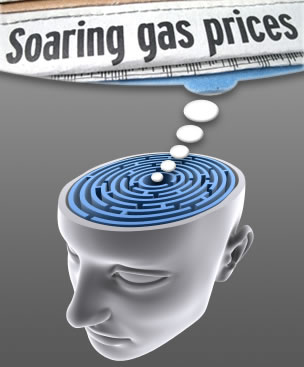Will Driving Habits Really Change?
 Just about every news pundit on TV has declared that THIS is finally the oil price change that shocks Americans out of their gas-guzzling ways. It’s hard to argue with that logic. Trucks and big SUVs are piling up on dealer lots. Consumers looking to trade in one of those thirsty vehicles find that its value has dropped by thousands of dollars in a few months. General Motors is shuttering truck plants and has put its HUMMER brand up for review and potential sale. This looks like the real thing. But is it? Maybe our tricky brains will surprise everyone…
Just about every news pundit on TV has declared that THIS is finally the oil price change that shocks Americans out of their gas-guzzling ways. It’s hard to argue with that logic. Trucks and big SUVs are piling up on dealer lots. Consumers looking to trade in one of those thirsty vehicles find that its value has dropped by thousands of dollars in a few months. General Motors is shuttering truck plants and has put its HUMMER brand up for review and potential sale. This looks like the real thing. But is it? Maybe our tricky brains will surprise everyone…
In my last post about anchor prices, I cited gasoline as an example of a product with unusually flexible anchoring – we define a bargain price by comparing the price we see to what we saw last few stations we passed. But there’s an underlying anchor, too – even as I enjoy saving a dime per gallon at a cheaper location, there’s another part of my brain that’s feeling the pain of an $80 fill-up. It’s the latter emotion that drives people to cut back on the miles they drive, trade in their Escalade for a Prius, join a carpool, etc. In essence, that buying pain is severe enough to drive behavioral change.
That underlying anchor may be more persistent than the “bargain hunting” anchor, but it will change. Even if gas prices stay in the $4 range, sooner or later that costly fill-up will seem normal. The buying pain, and that little voice yelling, “rip-off!” will go away. And, to some degree, our habits will revert from a focus on conservation to our more normal motivations: convenience, status, etc.
I do think our driving habits will change somewhat. This will be driven by economic necessity in some cases – if filling up your gas tank is a major financial burden, you’ll definitely look for ways to minimize that. And even for those who can afford a few bucks extra at the pump, the value equation will have changed – fuel economy will rise in importance when buying a new vehicle. But, I wouldn’t be surprised if in the coming year many of us DO reset our mental anchors for gas. Big SUV sales won’t ever hit the levels they enjoyed a couple of years ago, but the decline we are seeing now will slow and eventually reverse itself. The number of miles driven by Americans, now in decline, will also bottom out and start to recover.
Of course, if there are big new jumps in fuel prices, all bets are off: the anchoring process will start over again.
